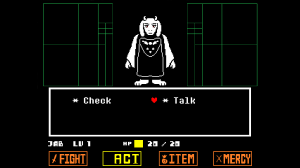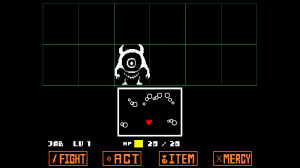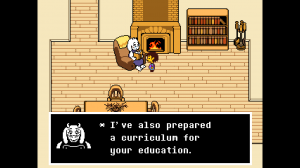Undertale was released near the end of 2015 and quickly earned a reputation from many as one of the best games of the year and a smash hit from the Indie market. While it may look like a throwback to early JRPG design, this is definitely a game that is greater than the sum of its parts.
Monster Mash:
The story is that it’s been years since a great battle between humans and monsters which the monsters lost. Since then, they’ve moved to a mountain and built a world underground to remain there for the foreseeable future. You play as a curious child who attempted to climb the mountain to trip and fall into the underground world and are now trying to get home.
One look at Undertale is all you need to see the JRPG inspiration; the game looks like the long-lost relative to the hit Mother series. Undertale also has a great soundtrack that does an amazing job of displaying the different emotional beats of the game. The basic mechanics should be familiar to anyone who has played a JRPG in the last 20 years.
Each area is full of enemies and puzzles standing in your way, with the occasional boss fight for good measure. As you play, you’ll collect items and gear and of course level up in order to become stronger and fight the enemies.
Yet, fighting is not all that you can do to the monsters of the world and is where Undertale features several subversive tricks up its sleeve.
An Emotional Experience:
While the combat interface looks straight out of Dragon Quest or Earthbound, Undertale is not about traditional combat. If you decide to attack an enemy, you’ll be given a QTE to try and land a stronger shot. Each enemy attacks via a bullet hell sequence, where you must maneuver your heart around to avoid bullets of a variety of sizes and patterns from hitting you. One great touch is that every enemy has their own unique sequence which lends into giving them more of a personality than your generic JRPG monsters.

Undertale’s story can go in some very different directions based on how you respond to the characters
And then there’s the big twist: You don’t have to fight. A second option is to talk to the monsters and figure out how to make them want to just leave the fight or become friends with you.
This is done via the “ACT” option and picking how to respond to the monster. Getting a monster to leave will award you gold and no experience, but it is possible to do this for every fight in the game.
Making things more interesting, the game tracks your decision throughout the game and there are multiple endings depending on how violent/passive you are. This gives Undertale a different feeling than other RPGs; you’re not just killing random creatures out to get you, but characters that have lives and emotions.
The morality system in Undertale is interesting and one I’m sure people will be talking about for some time. It’s always present and the game does change depending on what you choose; fighting and killing rewards you with experience that lets you do it easier, while talking simply awards you gold and can be the quicker option in some cases. The game goes to great lengths to flesh out every character in the game; none of the bosses are simply bad guys being bad, but characters with their own emotional arc and story to them; making the choice to spare or kill them that much harder.
For people who replay Undertale, they’ll find that their choices will come back to haunt them; especially if they dare go for the genocide ending, and yes, it’s as disturbing as the name indicates.
This kind of setup makes Undertale very hard to review, as it was explicitly designed in this manner.
How do you feel?
Undertale may end up being one of the most polarizing games of 2015. For people looking for challenging combat and JRPG design, Undertale is not going to do it. While the use of bullet hell mechanics is interesting, the gameplay is not the real experience; it’s the story that you create based on your decisions in the game. And from a story perspective, Undertale is one of the most unique games to come out in some time, and will be talked about for a very long time.

the bullet-hell defense system surprisingly fits well with the game and offers a closer look at the different enemies
Unfortunately, this is one of those games where I can’t talk more about what makes Undertale so special, as any discussion would spoil the story and the major reveals.
As I’ve said on the cast and in posts, my focus is on mechanics and design; I prefer great game design over great storytelling. This means Undertale is not exactly the game for me, but it’s still an impressive title and once again shows the creativity from the Indie market. For more from Undertale, you can check out my video spotlight.



